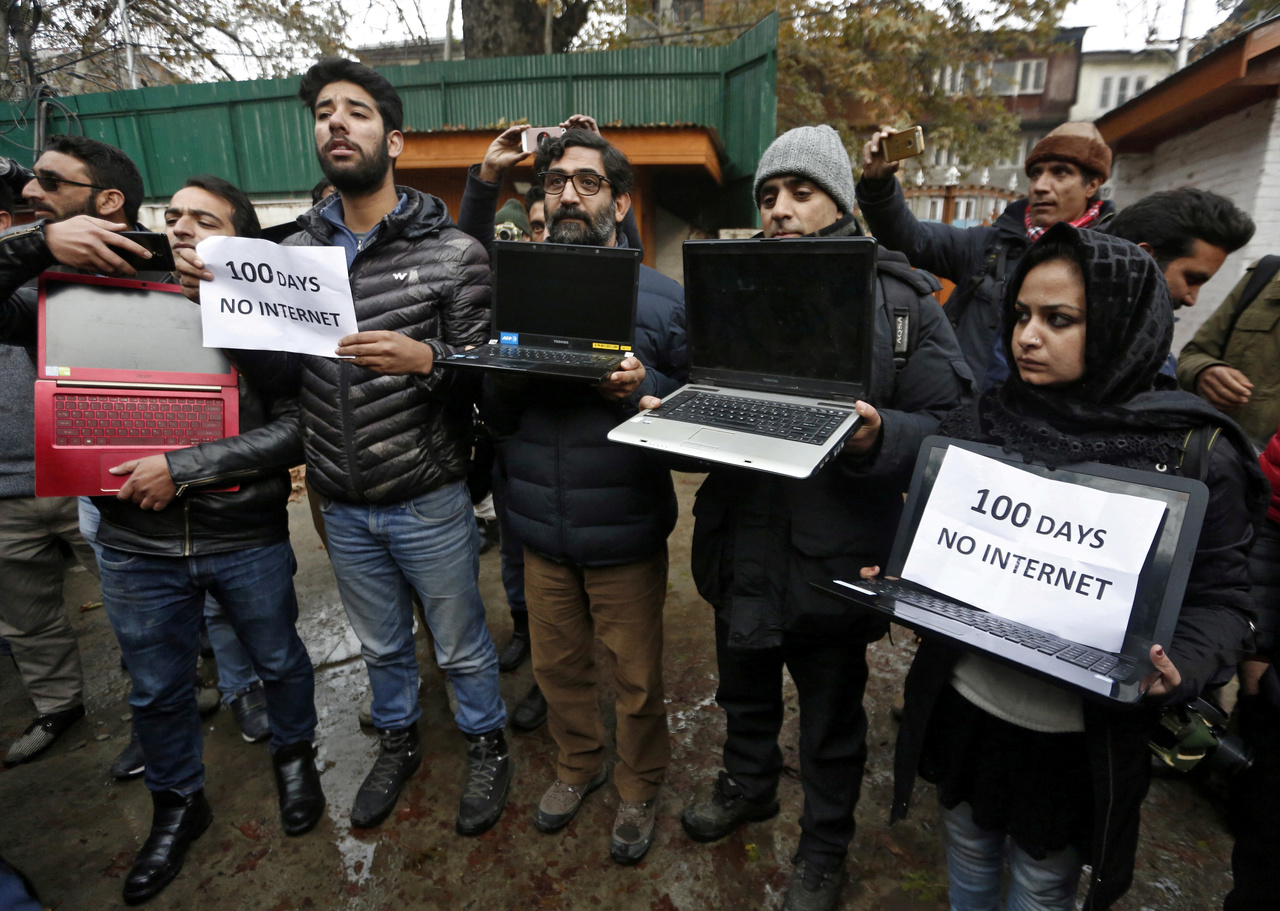India top court rules Modi government's 'limitless' Internet shutdown in Kashmir illegal
Sign up now: Get insights on Asia's fast-moving developments

Kashmiri journalists display laptops and placards during a protest demanding restoration of internet service in India on Nov 12, 2019.
PHOTO: REUTERS
NEW DELHI (REUTERS, BLOOMBERG) - India's Supreme Court said on Friday (Jan 10) that an indefinite shutdown of the internet in Kashmir was illegal, rebuking the government for the communications lockdown imposed after it withdrew the Muslim majority region's autonomy in August.
Indefinite suspension of the internet violated India's telecoms rules, the court said, ordering authorities to review all curbs in Kashmir in a week.
"Freedom of Internet access is a fundamental right," Supreme Court justice N. V. Ramana said.
"Freedom of Internet access is a fundamental right," Supreme Court justice N. V. Ramana said.
The ruling stopped short of overturning the communication and transport restrictions that have been in place since Aug 5 when Prime Minister Narendra Modi scrapped nearly seven decades of autonomous status of Kashmir.
There was no mention of the political leaders - including three former chief ministers - who've been detained since the shutdown began.
His Hindu-nationalist government has frequently used internet shutdowns as a tool to quell dissent in troubled parts of the country.
Last month, authorities imposed an internet clampdown in parts of the capital and in areas of the eastern state of Assam and Uttar Pradesh in the north as protests raged against a new citizenship law that Muslims see as discriminatory.
The shutdown in Kashmir, which has been on for more than 150 days, is the longest such outage in any democracy, according to digital rights group Access Now.
The government has argued that the blackout in Kashmir, a Himalayan region claimed by neighbouring Pakistan and plagued by separatist militants, was essential to maintain calm.
The Supreme Court's decision, which also asks authorities to make public all orders on internet shutdowns, should enable more scrutiny of suspensions, internet freedom activists said.
"This sheds light on the rationale behind internet shutdowns which then can be challenged as being constitutional or proportionate or not," said Nikhil Pahwa, digital rights activist and editor of MediaNama, a Delhi-based publication. "So if the state is forced to be transparent, they will be more accountable."
Last month, authorities imposed an internet clampdown in parts of the capital and in areas of the eastern state of Assam and Uttar Pradesh in the north as protests raged against a new citizenship law that Muslims see as discriminatory.
The shutdown in Kashmir, which has been on for more than 150 days, is the longest such outage in any democracy, according to digital rights group Access Now.
The government has argued that the blackout in Kashmir, a Himalayan region claimed by neighbouring Pakistan and plagued by separatist militants, was essential to maintain calm.
The Supreme Court's decision, which also asks authorities to make public all orders on internet shutdowns, should enable more scrutiny of suspensions, internet freedom activists said.
"This sheds light on the rationale behind internet shutdowns which then can be challenged as being constitutional or proportionate or not," said Nikhil Pahwa, digital rights activist and editor of MediaNama, a Delhi-based publication. "So if the state is forced to be transparent, they will be more accountable."
In 2019, India's documented internet blackouts lasted for more than 4,000 hours, costing Asia's third-biggest economy US$1.3 billion (S$1.8 million), according to a report by website Top10VPN.
An uneasy calm prevails in Kashmir. The internet was restored in hospitals last week and some mobile phone connections are working.
The blackout has severely disrupted the lives of millions and had an impact on everything from college admissions to businesses filing tax returns.
"The court also said the freedom of press is impacted by the shutdown," said Vrinda Grover, an advocate representing petitioners, who include journalists and civil society members.
"It is an abuse of power."
An uneasy calm prevails in Kashmir. The internet was restored in hospitals last week and some mobile phone connections are working.
The blackout has severely disrupted the lives of millions and had an impact on everything from college admissions to businesses filing tax returns.
"The court also said the freedom of press is impacted by the shutdown," said Vrinda Grover, an advocate representing petitioners, who include journalists and civil society members.
"It is an abuse of power."


